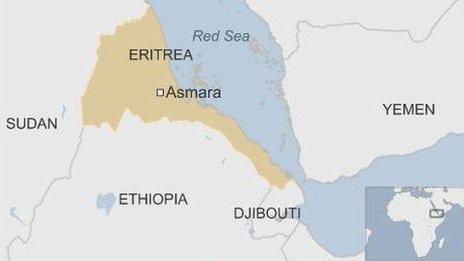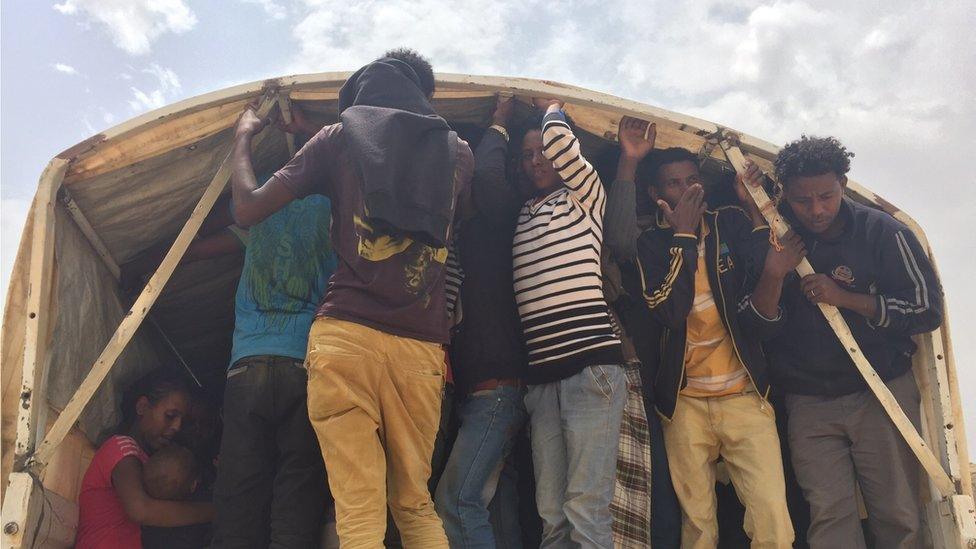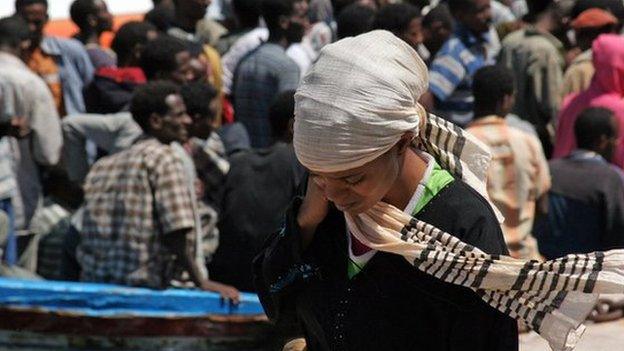Eritrea conscription still indefinite, says Amnesty
- Published

Many Eritreans, including unaccompanied children, first flee over the border to Ethiopia
Conscription in Eritrea continues to be indefinite despite the government saying last year it would be limited to 18 months, Amnesty International says.
The compulsory service, which often lasts decades, is the main reason cited by those who flee the country.
Eritreans make up the third-largest number of migrants trying to reach Europe, after Syrians and Afghans.
Amnesty said European states are increasingly rejecting asylum requests despite the reality on the ground.
Its 57-page report - Just Deserters - says in the second quarter of 2015, the UK government rejected 66% of Eritrean asylum cases in first instance decisions.

2015 Eritrean asylum cases in the UK
In March, UK guidelines regarding granting asylum to Eritreans were updated to say they were now able to return to the country safely:
Jan-March: 703 granted; 160 rejected
April-June: 303 granted; 599 rejected
July-Sept: 373 granted; 580 rejected
Source: UK Home Office

"The situation facing conscripts in Eritrea is desperate and exposes the lie behind claims made by certain host countries that most Eritreans arriving at their borders are economic migrants," Amnesty International's Michelle Kagari said in a statement, external.
"These people, many of them children, are refugees fleeing a system that amounts to forced labour on a national scale."
The Eritrean government has maintained that those who leave are economic migrants and has said Eritrean "victims of human trafficking" who return home will not face punishment., external
But the UK-based rights group's interviews with 72 Eritreans who fled the country since mid-2014 found this not to be the case.
In 2015 the UN estimated around 4,000 people left Eritrea every month
Some of the people interviewed said they had been conscripted for more than 10 or 15 years before fleeing; others had husbands or fathers still conscripted after 20 years of service.
"My father has been in military conscription since before I was even born," 18-year-old Binyam told Amnesty.
He said his father was paid 450 nakfa a month, which is $43 (£29) at the official exchange rate but the report says in reality is nearer $10.
This salary is not "even enough to buy oil", Binyam said, adding that his father only saw his family every six months for one or two weeks.
"If he overstayed, his division would come and take him back
"My older sister was in conscription for three years and then escaped to Ethiopia. I left just before I was conscripted to avoid it."
Low-paid conscripts are also deployed in civilian roles including farming and construction, the report said.
According to Amnesty, people caught trying to evade national service are detained, sometimes indefinitely, in appalling conditions often in underground cells or in shipping containers.
That fate is likely to befall those forcibly returned after the rejection of their asylum applications in Europe or elsewhere, the rights group warned.

Eritrea - key facts

Nation of six million on Red Sea - one of Africa's poorest countries
One-party state - no functioning constitution or independent media
Former Italian colony, later formed loose federation with Ethiopia
1962 - Ethiopian Emperor Haile Selassie dissolved Eritrean parliament, seized Eritrea
Eritrean separatists - the Eritrean People's Liberation Front - fought guerrilla war until 1991, when they captured capital Asmara
Eritrea voted for independence in 1993
May 1998 border dispute with Ethiopia led to two-year war costing 100,000 lives
Still no peace settlement - thousands of troops face each other along 1,000km (620-mile) border

- Published17 July 2015

- Published13 March 2015

- Published10 July 2015

- Published9 November 2015

- Published15 November 2018
- Published23 February 2015

- Published26 September 2014
